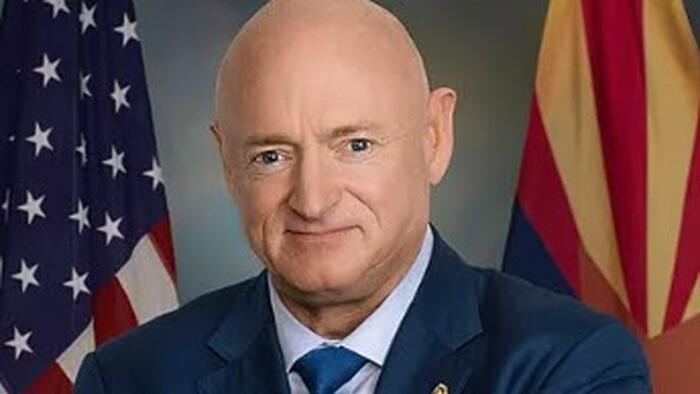
Bet on censorship: Senator Kelly becomes latest MP to suggest no dissent on social media
Written by Jonathan Turley,
Below is my New York Post column on Sen. Mark Kelly (D., Ariz.)’s suggested censorship of banking critics. Was just the latest example of how censorship has become a knee-jerk response by many Democrats to opposing viewpoints.
It is now increasingly common for certain views to be declared simply too dangerous to be tolerated or allowed on social media, including (it seems) questioning the solvency of banks.
Here is the column:
Worried about your money after the recent bank failures? You may want to keep these thoughts to yourself.
While some rushed to get their money after the collapses, at least one Democratic leader is pushing for censure of those who have no faith in the banking industry.
The Democratic Party for more than a decade has alienated many of us with its embrace of censorship and controls on speech.
Democratic leaders actively promote social media censorship and vehemently defend government efforts to target citizens or groups.
Some have even adopted McCarthyian labels like “Russian lovers” to paint free speech advocates as disloyal or dangerous in opposing censorship efforts.
Topics ranging from climate change to gender identity, COVID and the election have been gradually added to the list of forbidden thoughts.
Now Sen. Mark Kelly (D-Ariz.) has put bank solvency on the list.
It’s just the latest example of the slippery slope of censorship.
Kelly shows how addictive censorship is; it builds not only an increasing tolerance for the limits of speech, but a decreasing tolerance for opposing viewpoints.
The immediate inclination becomes to silence those who challenge you or refuse to accept your “truth” on any subject.
In a Zoom call this week with a couple of hundred participants, Kelly asked representatives of the Federal Reserve, the Treasury Department and the Federal Deposit Insurance Corporation about social media censorship to remove those who raise doubts about bank solvency in the wake of Silicon Valley Bank and Signature Bank. crisis
Rep. Thomas Massie (R-Ky.) confirmed that Kelly suggested “that the government should work with social media companies to censor information that could lead to an attack on banks.”
As in previous calls for censorship, Kelly cited the danger of “foreign actors” using social media to undermine banks. It’s those pesky Russians again.
The list of subjects that justify censorship is getting longer.
In a critical hearing in November 2020, tech CEOs appeared before the Senate. Then-Twitter CEO Jack Dorsey apologized for censoring The Post’s Hunter Biden laptop story, but vowed to censor more people in defense of “election integrity.”
Sen. Chris Coons (D-Del.), however, was not happy. He didn’t mind the promised censorship, just that it wasn’t broad enough.
He noted that it is difficult to define the problem of “misinformation,” but tech companies had to impose a comprehensive system to combat the “harm” of misinformation.
“The pandemic and the misinformation about COVID-19, the manipulated media is also causing damage,” Coons said. “But I urge you to reconsider” launching a “stand-alone climate change disinformation policy” because “helping to spread climate denial, in my view, further facilitates and accelerates one of the greatest existential threats to our world “.
Sen. Richard Blumenthal (D-Conn.) also warned that he and his colleagues would not tolerate any “rollbacks or demotions” from companies that “fail to take action against dangerous misinformation.”
He demanded that companies continue to use “the same kind of robust content modification” — the new Orwellian term for censorship — that they did in the 2020 election.
History has shown that censorship becomes an insatiable appetite. Once you silence dissent in one area, dissent in other areas becomes increasingly intolerable.
Instead of convincing citizens that their deposits are safe, it’s easier to silence anyone who disagrees with you.
With vocal support from Democrats, Twitter’s former censors recently revealed the standard they used to censor citizens.
Former Twitter executive Anika Collier Navaroli explained in a House hearing last month that Twitter tried not only to “balance freedom of expression and security.”
Rather, he asked “free speech for whom and public safety for whom. So whose free speech are we protecting at the expense of whose safety, and whose safety are we willing to allow the can people speak freely?
Rep. Melanie Stansbury (D-NM) responded, “Right.”
So now “the cost” of free speech is too high if it can undermine faith in the stability of our banks. It’s that easy.
Parag Agrawal explained it years ago. After taking over as CEO of Twitter, Agrawal said the company would “focus less on thinking about free speech” because “speech is easy on the Internet. Most people can speak. Where especially emphasizes our role is who can be heard.”
The great civil libertarian Justice Louis Brandeis once warned, “The greatest dangers to liberty lie in the insidious encroachment of men of zeal, well-meaning but without understanding.”
Senator Kelly is now the man seeking censorship to protect bank assets while leaving free speech insolvent.
